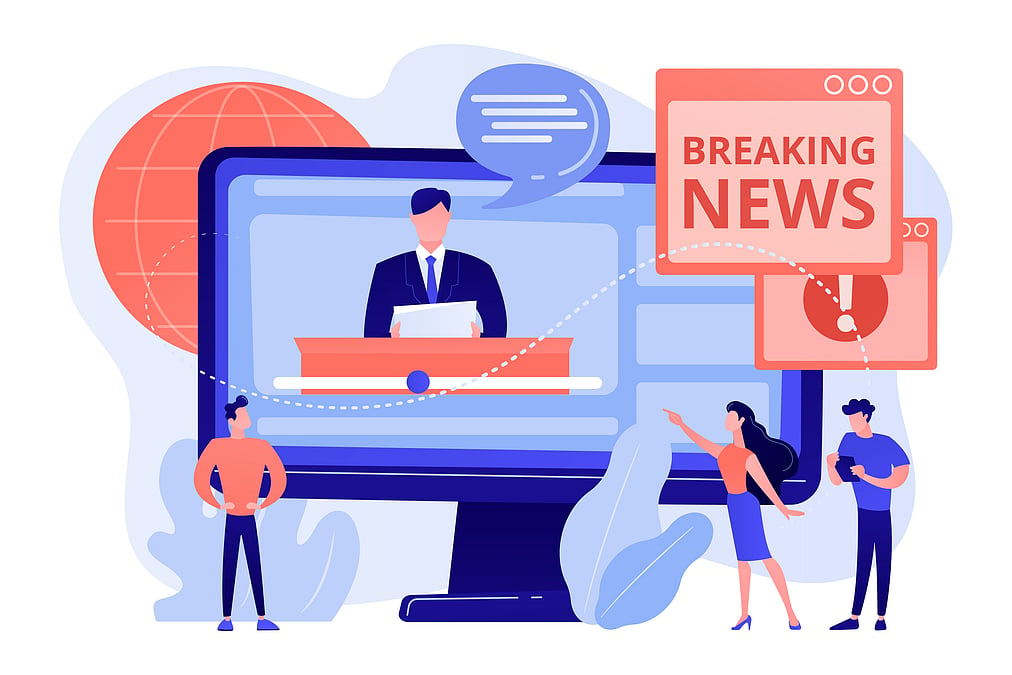A Biased View of Online News
A Biased View of Online News
Blog Article
Online News - An Overview
Table of ContentsFacts About Online News UncoveredIndicators on Online News You Should KnowSome Of Online NewsThe Best Guide To Online NewsSome Known Factual Statements About Online News
For example, numbers for the proportion of people paying for online information were within the margin of error for both studies. Allow's initial take into consideration individuals that have access to information that you would generally have to pay for. It makes good sense to begin here since some people have actually access to paywalled news via totally free tests, through their job, and so on.There are different kinds of accessibility, but the three most common are registrations to on the internet information from a single brand, subscriptions to a print/digital package from a single brand, and a membership to multiple brands aggregated in one place. Of these, digital-only subscriptions to a solitary brand name are the most typical type of accessibility in all 3 countries.
Paid information collectors are relatively prominent in the United States, generally many thanks to Apple News+, yet presently these are far much less common than memberships to solitary information brand names. As we saw in the Executive Recap, people generally have access to among a small team of famous brands. In the US, over fifty percent of these individuals have access to either the New York Times or the Washington Message, and in the UK, it's The Times or the Telegraph.
What Does Online News Do?
Most of this group have access since they are paying for subscriptions with their very own cash 75% in Norway and the UK, and 84% in the United States. Online News. For under-45s the figure is lower. But among those 45 and over, the large bulk of those who have gain access to are paying with their very own cash.
In the United States and especially Norway, several publishers have introduced paywalls, which implies even more individuals will be asked to pay maybe enhancing a sense of deficiency and developing a feeling that information might be worth paying for. In the UK, by comparison, just a reasonably handful of magazines try to bill for news.
In this respect it interests compare the different reasons customers offer in the United States and United Kingdom for spending for on-line information. Overall, one of the most important element is the diversity and quality of the material. In both countries, customers believe they are improving info than from complimentary sources.

The Definitive Guide to Online News
These added elements appear to be specifically important for retention as they construct habit and are less replicable somewhere else. For Norwegians too the distinctiveness of content triumphed along with convenience and convenience of usage. 'Aftenposten is a significant newspaper with excellent quality', said one participant, however it was striking that 'sustaining good journalism' is less of a motivation (21%) perhaps due to the fact that mainstream media electrical outlets are seen as less polarised in Norway.
Additionally, around half of those who presently have open door state that they may start paying if their cost-free gain access to goes out. This is motivating, and probably extra motivating still is that these numbers suggest retention prices that are similar to those for registrations to video and audio streaming services like Netflix and Spotify.
It can likewise be seen as a helpful pointer that individuals do not necessarily subscribe for life, and boasts about the variety of 'new customers' may not be informing the whole tale (Online News). There's considerable 'spin' in this location, as several people end their complimentary trials prior to they have to pay, or just terminate their memberships to spend their cash on various other things
Female, 37, Norway It cost means way too much and I can get round the paywall. Male, 36, United States Too pricey, felt there was nothing I couldn't obtain for cost-free on Apple Information. Female, 19, UK In the UK, the number of individuals that made use of to have access to paid news (10%) is close to the number of people that currently have accessibility (9%) with the equal numbers from the US and Norway higher still (albeit less than the number of people with accessibility).
How Online News can Save You Time, Stress, and Money.
As we have actually currently seen, existing clients are relatively happy, yet with income from electronic advertising unsure many authors will be wanting to enhance the number of new subscribers. In comparing our 3 nations we see some interesting distinctions that could inform author methods. We observe a really high proportion (40% in the US and 50% in the UK) who state that nothing could convince them to pay.
In Norway, where rate of interest in information tends to be higher and where free information is a lot more limited only 19% state they could not be persuaded. Rate and convenience are some of the vital variables that can make a distinction. In Norway, a 3rd (30%) say they could subscribe if it was less expensive and 17% if they can pay to access numerous websites from a single payment.
Publishers have progressively been offering differential prices to grab business from those not likely to pay complete cost (e.g. abroad consumers and pupils). Paying i was reading this to avoid invasive advertisements is an additional prospective course for publishers, with around one in seven participants in all 3 countries claiming this this might tempt them to subscribe.

Some Known Facts About Online News.
The anxiety of missing out on out can be an effective obstacle. Some electrical outlets currently ask viewers to register with them in order to have the ability to access a little number of short articles free of charge. Numerous reporters would see this as a fair compromise, but the public are much more skeptical. In all three nations fewer than half believe registering is a reasonable trade, however it's also clear that individuals are not strongly opposed either.
In between 13% and 22% in our three nations say they registered to access news web content in the in 2014. Some are additionally using various other techniques review to navigate paywalls such as resetting cookies, altering their internet browser setups, or even downloading and install devoted software program. Simply a 3rd say they have ever tried to do something like this, as it needs a specific level of electronic literacy, and several are probably not aware that is a possibility.
People have various views concerning the legal rights and wrongs of trying to news avoid paywalls. Few would certainly say that this is always reasonable, however some people do have appointments around vital public-interest journalism only being available to those prepared and able to pay for it. A paywalled expos of the UK federal government's handling of the coronavirus break out by the Sunday Times caused a warmed discussion about the problem on Twitter, with some attempting to honestly share the complete post.
Report this page